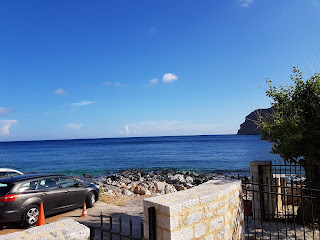Saturday June 16
Before leaving Canada, I booked a “private” tour with Tours
by Locals which appears to be out of Vancouver. It was recommended to me by a
friend who is in the tourist business and who mainly handles the corporate
travel section. This is the Airbnb for tour guides. We arranged our little trip
with Yorgos, who from my very first communication with him, has been fantastic.
Panos, is his brother.
What can I say about today other than since we left Kalamata
I don’t think I have stopped smiling! I have found “my Greece!”
We left Kalamata around 9:30 and began our journey down into
the Mani. The dramatic landscape is rugged and wild like Scotland, but with its
own unique qualities. The stony, at first lush green then spasmodically
vegetated grey mountain range follows down the middle of the peninsula while
the turquoise Ionian Sea decorates the western side. The Cyprus trees add
dimension to pictures, while the oleander, bougainvillea, plumbago, and morning
glory add colour. And then there is the army of thorns that hangs around your
legs and ankles trying to discourage you from invading this Utopian nature. Mani
is unique, special. Why?
The roads linking all the towns are narrow, windy, and hilly,
but always with panoramas that stretch the mind to the horizon. In the
settlements of the north, the towns were protected by the privately owned
“towers” and fortified houses of the local elite. In the southern settlements
colectively owned war houses protected the homes of family members who all
shared in the building and collected there when there was danger from warring
clans or other enemies. These tower houses, built from stone with terra cotta
tiled rooves, stand out from the hill side villages like tall and proud Cyprus
trees. Some are still used for living in, or, in many cases, the tower homes
are dormant either boarded up or left to nature to play with.
Typical village
structures include: elegantly designed Byzantine churches with their insides adorned
with different stages of fading carved marble iconostases and murals telling
familiar stories from the Bible; petite family churches and cemeteries; communal
fountains providing meeting places for gossip and political discussions, and
always the central square where children play, parents converse, coffee is
taken, and bonding in community and family life continues. The coast line is
dotted with little harbours which provide communication between Mani and the
outside world. The numerous natural anchorages serve to provide havens during
storms for boats…and pirates!
We drove slowly down the west coast stopping at little
villages and other points of interest along the way: the jewell at Kambos was
the Byzantine church of Ag Theodorii.
The outside of the church, which is on the main road, is uninteresting, but
inside the paintings, or what remains of them, are quite beautiful.
Our next stop was Kardamyli, one of the oldest settlements in
the Peloponnese and very pretty. We wandered through the town looking at Lela’s
Tavern and the sea front, the beautiful views of the ocean and the town, the old town, the Church
of Saint Spyridon, and the Mourtzinos Tower complex.
When we had worn ourselves out in Kardamyli we drove on and
looked down on the village of Kalamitsi where the famous author Patrick Leigh
Fermor lived in his later years.
We ate lunch in Thalames, and passed many other little towns
including Langada, Neo Itilo, Limeni, and Areopoli before resting for the night.
It was all remote, and utterly stunning, but Gerolimenas, our overnight stop was a sanctuary. Located at the south end of Mani, this fishing village, although there was some tourism, felt isolated from the rest of the world, surrounded by beautiful stone houses, with a background of fishing boats, rocky mountains, and aquamarine ocean. Divine!
Our hotel was beautiful: the Kyrimi, and we enjoyed a
delicious dinner at a seaside restaurant before retiring to bed and the ocean
waves lulling us to sleep.







































No comments:
Post a Comment